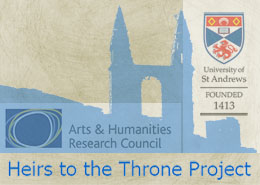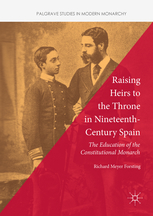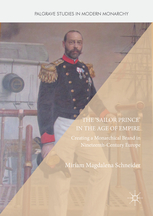Professor Frank Lorenz Müller studied History and English at Berlin Free University and Humboldt University) and Oxford before completing his doctorate – an analysis of British attitudes to German nationalism – at Oxford in 1999. Having held a Junior Research Fellowship at University College Oxford (1999-2001), he joined the School of History at St Andrews as a lecturer in 2002. Since then he has worked mainly on the revolutions of 1848/49, militarism and nationalism in 19th-century Germany, German reactions to the British political system and – more recently – on the life of Emperor Frederick III within the political cultures of Prussia and Germany. Supported by grants awarded by the Royal Society of Edinburgh, the AHRC and the Carnegie Trust for the Universities of Scotland, this research has resulted in the publication of a major new life of Frederick III (Harvard University Press, 2011) and to the development of a larger comparative research project exploring the roles of royal heirs within the constitutional monarchies of 19th-century Europe.
Email: flm3[at]st-andrews.ac.uk
Individual Project
Heirs and Final Acts:
The Dynastic Future of the Smaller German “Fatherlands” after 1871
This project involves a three-way comparative analysis of the functions and publically ascribed roles of three royal heirs – of three men who, as kings, would go on to be the last of their kind: Wilhelm II of Württemberg (1848-1921), Friedrich August III of Saxony (1865-1932), and Ludwig III of Bavaria (1845-1921).
The foundation of the German Reich in 1871 created a Prussian-led league of monarchical states and Free Cities, in which the king of Prussia, as “German Emperor”, was to lead the other German princes as primus inter pares. A wider all-German identity was to complement and flourish alongside the patriotism engendered by more than 20 narrower homelands, such as Bavaria or Saxony. The complex compromise between federal diversity and centralising unity, between Prusso-German dominance and the loyalties to local dynastic and cultural traditions within these smaller “Fatherlands” (A. Green) inevitably threw up tensions, though.
This is the context into which I wish to place my exploration of the roles of three crown princes who were all born before the foundation of the Reich and would all witness the end of their monarchies in 1918. Their kingdoms were small – in 1890 Bavaria had 5.5 million inhabitants, Saxony 3.5 million, and Württemberg 2 million –, but their political cultures differed markedly from that of their mighty Prussian neighbour. Moreover, the Württembergs, Wettins and Wittelsbachs were ancient dynasties with a strong sense of their own dignity and history.
I intend to use the royal heirs to the crowns of Württemberg, Saxony and Bavaria – i.e. the very embodiments of the dynastic-monarchical future of these states – as prisms to gain a comparative analytical perspective. I will investigate the careers, systemic functions and public portrayals of these men during the period from the foundation of the Reich in 1871 until their respective accessions in 1891, 1904 and 1912.
Some of the key questions guiding my research will be:
- To what extent were these royal heirs (seen as) acting as representatives of local traditions specific to their own monarchy and distinct from a wider Prusso-German identity?
- Were they understood as vehicles of hope of a future for their Fatherlands that was distinct from the wider German context?
- What role were these heirs (seen to be) playing in the future constitutional development within their own kingdoms.
- What was expected from these future monarchs in terms of defining a future role for the monarch in fields such as culture, societal integration and economic development?
- With all of these heirs there were deviations from the ideal of a dynastic succession: Wilhelm was without male issue; Ludwig was the son of a prince regent (Luitpold); Friedrich August was merely the heir-presumptive to his childless uncle, King Albert. To what extent were these deviations perceived as problematic for the continuation of the monarchical system?
- To what extent can the hopes (and apprehensions) for the future of the kingdoms under these rulers before their accessions be linked to the sudden end of Germany’s monarchies in 1918?
Main Publications
Books
- Our Fritz. Emperor Frederick III and the Political Culture of Imperial Germany (Cambridge/Mass: Harvard University Press, 2011) – A German translation will be published by Siedler in 2013.
- Britain and the German Question. Perceptions of Nationalism and Political Reform, 1830-1863 (Basingstoke: Palgrave/Macmillan, 2002)
- Die Revolution von 1848/49 (Darmstadt: Wissenschaftliche Buchgesellschaft, 2012 [4th ed.])
Articles
- Liberaler Volkskaiser und hochgemuther Recke: die Mythen um Kaiser Friedrich III. (Friedrichsruher Beiträge, Bd. 42, Otto-von-Bismarck Stiftung, 2012)
- “Perhaps also useful for our election campaign”: The Parliamentary Impasse of the Late Wilhelmine State and the British Constitutional Crisis, 1909-1911’, in: D. Geppert/R. Gerwarth (eds): Wilhelmine Germany and Edwardian Britain. Essays on Cultural Affinity (Oxford: Oxford University Press, 2008), 67-87
- Man, Myth and Monuments: The Legacy of Otto von Bismarck (1866-1998), European History Quarterly 38 (2008), 626-636
- The Spectre of a People in Arms: The Prussian Government and the Militarisation of German Nationalism, 1859-1864’, English Historical Review cxxii (2007), 82-104
- Palmerston, Schwarzenberg and the Struggle for a New German Order’, in: D. Brown/M. Taylor (eds): Palmerston Studies II (Southampton: Hartley Institute, 2007), 97-118
- “The Enlightened Views of the Prussian Monarch.” Preussen als Hoffnungsträger britischer Reformvorstellungen für Deutschland, 1834–1863’, in: B. Becker/V. Czech/J. Luh (eds): Preussen, Deutschland und Europa, 1701–2001, (Groningen: INOS, 2003), 197-215
- Imperialist Ambitions in Vormärz and Revolutionary Germany: the Agitation for German Settlement Colonies Overseas, 1840-1849’, German History 17 (1999), 346-368
- Der Traum von der Weltmacht. Imperialistische Ziele in der deutschen Nationalbewegung von der Rheinkrise bis zum Ende der Paulskirche’, Jahrbuch der Hambach Gesellschaft 6 (1996/97), 99-183





